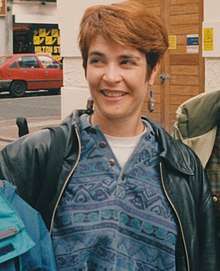Jo-Anne Richards
Jo-Anne Richards is a South African journalist and author.[1]

Jo-Anne Richards | |
|---|---|
| Born | Port Elizabeth, South Africa |
| Occupation | Author, journalist |
| Nationality | South African |
| Alma mater | Rhodes University |
| Notable works | The Innocence of Roast Chicken, Touching The Lighthouse, Sad At The Edges, My Brother's Book, The Imagined Child |
| Years active | 1996– |
| Website | |
| joannerichards | |
Biography
Jo-Anne Richards grew up in Port Elizabeth, South Africa, and was educated at Collegiate Girls' high school. Her first books that she read were The Boy Next Door and The Island of Adventure.[2] She graduated from Rhodes University in Grahamstown in 1979, followed by an Honours degree in Journalism and Linguistics. She holds a PhD in Creative Writing from the University of the Witwatersrand, where she was a lecturer in journalism for 15 years.
Richards worked full-time for four South African newspapers – The Star, the Sunday Express, the Cape Times and Evening Post – reporting, sub-editing and news-editing. She has written features and supplements for numerous South African magazines and newspapers, including Fair Lady, Elle, Diversions, True Love, the Sunday Times Magazine, The Star and the Mail & Guardian.
Richards rose to prominence with her first novel, The Innocence of Roast Chicken (1996), which became a bestseller in her native country and was short-listed for the M-Net Book Prize and nominated for the Impac International Dublin Literary Award. Richards wrote on concepts such as striving and slacking in a dead book proposal in the mid 1990s.[1]
She lives in Cape Town, where she teaches creative writing.
She is National Chair of the South Africa Turner's Syndrome Support Group.
Richards was once married to poet Mark Swift.[3]
Novels
- The Innocence of Roast Chicken (1996)
- Touching the Lighthouse (1997)
- Sad at the Edges (2003)
- My Brother's Book (2008) [2]
- The Imagined Child (2013)
References
- "Are you a striver, slacker or fantasist?". Financial Times. Financial Times. Retrieved 11 September 2018.
- "Talking authors: Jo-Anne Richards". Mail & Guardian. Mail & Guardian. Retrieved 11 September 2018.
- "Romantic poet who battled his demons". Independent Online. Independent Online. Retrieved 11 September 2018.